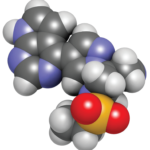WASHINGTON (Reuters) – The U.S. Food and Drug Administration (FDA) on Friday declined to approve a new drug for rheumatoid arthritis made by Eli Lilly and Co and partner Incyte Corp, the companies said on Friday.
The FDA indicated that additional clinical data was needed to determine the most appropriate doses of the drug, baricitinib (Olumiant), and to further characterize safety concerns across treatment arms.
The FDA’s request for additional data possibly means more than a year’s delay for this important product for both companies, and represents a break for other drugmakers who were expected to face tough competition from baricitinib.
Approval of the drug could have introduced a significant new competitor to a lucrative market that includes Pfizer Inc’s tofacitinib (Xeljanz), AbbVie Inc’s adalimumab (Humira) and Amgen Inc’s etanercept (Enbrel).
More than 23 million people worldwide suffer from rheumatoid arthritis. Current treatments include non-steroidal anti-inflammatory drugs, as well as older drugs, such as methotrexate.
Baricitinib is a once-daily pill in a class of drugs known as Jak inhibitors that includes twice-daily Xeljanz, which generated global sales in 2016 of $927 million.
Jak inhibitors block enzymes known as Janus kinases that cause inflammation. Analysts were expecting baricitinib to generate $1.7 billion in annual sales by 2023 according to Thomson Reuters data.
Baricitinib appears to have a better safety profile than Pfizer’s tofacitinib and would have been preferred by doctors on an approval by the FDA, according to Barclays analyst Geoff Meacham.
A survey of high prescribing rheumatologists conducted by Barclays found that 62% found baricitinib preferable to tofacitinib.
Jak inhibitors compete with injected biologics, including top-selling etanercept, which in 2016 generated global sales of more than $16 billion. Etanercept generated sales of nearly $6 billion.
Lilly said on Friday it was reaffirming its financial forecast for 2017 and its mid-term outlook for the remainder of the decade.
Incyte says it would evaluate the effect of the FDA’s response on its previously issued milestone and research and development expense forecast for 2017 and would provide an update on its first-quarter earnings call.
An approval of baricitinib would have triggered a milestone payment to Incyte of $100 million. Incyte would also have received additional sales-based milestone payments and royalties.
Data from a key late-stage trial, known as RA-BEAM, showed that patients taking baricitinib fared better than those taking either a placebo or adalimumab, which is injected once a week or once every other week. Overall efficacy was shown across four late-stage clinical trials.



